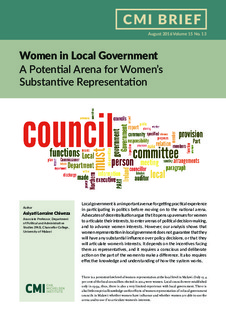| dc.contributor.author | Chiweza, Asiyati Lorraine | |
| dc.date.accessioned | 2018-01-04T08:22:13Z | |
| dc.date.available | 2018-01-04T08:22:13Z | |
| dc.date.issued | 2016-08-01 | |
| dc.identifier | oai:www.cmi.no:5930 | |
| dc.identifier.citation | Bergen: Chr. Michelsen Institute (CMI Brief vol. 15 no. 13) 4 p. | |
| dc.identifier.issn | 0809-6732 | |
| dc.identifier.uri | http://hdl.handle.net/11250/2475293 | |
| dc.description.abstract | Local government is an important avenue for getting practical experience in participating in politics before moving on to the national arena. Advocates of decentralisation argue that it opens up avenues for women to articulate their interests, to enter arenas of political decision-making, and to advance women interests. However, our analysis shows that women representation in local government does not guarantee that they will have any substantial influence over policy decisions, or that they will articulate women’s interests. It depends on the incentives facing them as representatives, and it requires a conscious and deliberate action on the part of the women to make a difference. It also requires effective knowledge and understanding of how the system works.
There is a persistent low level of women representation at the local level in Malawi. Only 13.4 per cent of the local councillors elected in 2014 were women. Local councils were established only in 1994, thus, there is also a very limited experience with local government. There is also little empirical knowledge on the effects of women representation of in local government councils in Malawi: whether women have influence and whether women are able to use the arena and to use if to articulate women’s interests.
This brief is based on an empirical study of three dimensions of women’s representation:
The political motivations of women councillors elected in the 2014 local elections
Perceived space for participation in local councils
Ability and motivation to use the arena to articulate women’s interests in particular, thus whether they act as representations for women.
Councillors’ motivations for standing as political representatives, and their abilities to articulate issues, are important indications of whether they perceive themselves as representatives for women and thus ‘act for women’ (articulate women’s interests).
The a | |
| dc.language.iso | eng | |
| dc.publisher | Chr. Michelsen Institute | |
| dc.relation | CMI Brief | |
| dc.relation | 13 | |
| dc.relation.ispartof | CMI Brief | |
| dc.relation.ispartofseries | CMI Brief vol. 15 no. 13 | |
| dc.relation.uri | https://www.cmi.no/publications/5930-women-in-local-government-potential-malawi | |
| dc.subject | Women | |
| dc.subject | Politics | |
| dc.subject | Local Government | |
| dc.subject | Malawi | |
| dc.title | Women in Local Government. A Potential Arena for Women’s Substantive Representation | |
| dc.type | Report | |
